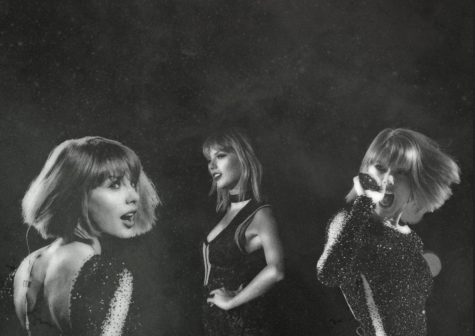It’s me, hi: Taylor Swift on queerness
November 30, 2022
Before I get ripped limb from limb, I have some disclaimers.
Most of Taylor Swift’s work is not my cup of tea, and I am by no means a Swiftie. However, I respect her as an artist — she’s good at what she does and is successful for a reason.

This is not a speculation piece on Taylor Swift’s sexuality. Public figures do not owe us information regarding their sexual orientation, and I personally find such efforts to be invasive. For that reason, I will be approaching this article under the assumption that Swift is a straight woman, as she has said on public record.
I don’t hate women, successful women or women in music. Though there is criticism of Swift out there rooted in these positions, this is not the case. Please rethink the belief that all criticism of Taylor Swift is synonymous with these ideas.
What this article does aim to address, however, is how Swift engages with queerness in her music and possible motivations behind her engagement.
What first comes to mind is the “You Need To Calm Down” music video from her 2019 album “Lover.” This music video was meant to be Swift’s grand announcement of her allyship with the LGBTQ+ community. Though the video featured a number of queer celebrities, such as Laverne Cox, the cast of Queer Eye, Ellen DeGeneres and Hayley Kiyoko, and clearly showed Swift as aligned with the queer community, the execution of the production perplexed me.
With lyrics like “throwing shade never made anyone less gay” and “why be sad when you can be GLAAD?” — playing on the slogan for the GLAAD company — was underwhelming and too little too late. The lyrics give less of an impression of meaningful allyship and more quippy, ad-friendly taglines that would work perfectly in a Pride Month ad — when the song was conveniently released.
Swift seems to equate her experiences with online and media harassment with the history of LGBTQ+ struggle. Now, Swift’s experiences getting her name and reputation dragged through the media is lengthy and horrific. The way the media and the general public treated her was beyond cruel. However, it is nothing short of ridiculous to imply that media harassment and centuries of queer oppression and violence against that community are even close to comparable.
I bring up this example to contextualize how Swift has previously depicted queerness in her music: as over-the-top and sanitized with a Target ad-esque sense of aesthetics coupled with very intentional marketing to the community.
When Swift released her newest album, “Midnights,” and a number of theories surrounding her sexuality surfaced, I was perplexed yet again. Lyrics to songs like “Question…?” and “Maroon” seemed to be developing a strong queer interpretation with ideas circulating on social media that they were about Swift’s possible romantic connection to model Karlie Kloss. Considering that these are some of the few songs that lack Genius comments from Swift talking about their meanings, the rumors only grew. #Gaylor on TikTok has over 350 million views and thousands of videos.
On top of this, Swift’s lineup of openers for her Eras Tour include artists who are publicly queer and/or have a strongly queer fanbase, such as Phoebe Bridgers, girl in red, Paramore, beebadoobee, HAIM and MUNA. In recent years, artists like these have gained a lot of traction and attention in mainstream media. For example, Phoebe Bridgers was nominated three times at the 64th Annual Grammy Awards and has over 8 million listeners on Spotify.
Whether or not Swift identifies as part of the LGBTQ+ community isn’t important for the purposes of this article. What is important is that there haven’t been any clarifying statements or acknowledgment of the rumors. Which leads me to the conclusion that this is no different than the “You Need To Calm Down” music video. Though more subtle than the video considering the backlash she received, Taylor Swift seems to be trying to intentionally market to the queer community in order to gain that same cult following other artists enjoy and make a profit.
At the end of the day, Taylor Swift is a businesswoman and knows how to market herself. What I am curious to see is how this move will affect the music industry as a whole. Other artists, like Harry Styles, have aligned themselves with the queer community in similar ways. The possibility of a new generation of popstars aligning themselves with queerness for profitability may appear progressive, but it ultimately reduces the LGBTQ+ experience to a money grab rather than a celebration of the complicated and nuanced lives and history of millions of people.






















Leave a Comment